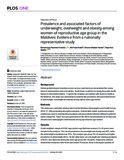| dc.contributor.author | Hashan, Mohammad Rashidul | |
| dc.contributor.author | Rabbi, Md Fazla | |
| dc.contributor.author | Haider, Shams Shabab | |
| dc.contributor.author | Gupta, Rajat Das | |
| dc.date.accessioned | 2022-05-24T05:29:18Z | |
| dc.date.available | 2022-05-24T05:29:18Z | |
| dc.date.copyright | 2020 | |
| dc.date.issued | 2020-10-29 | |
| dc.identifier.citation | Hashan, M. R., Rabbi, M. F., Haider, S. S., & Gupta, R. D. (2020). Prevalence and associated factors of underweight, overweight and obesity among women of reproductive age group in the Maldives: Evidence from a nationally representative study. PLoS ONE, 15(10 October) doi:10.1371/journal.pone.0241621 | en_US |
| dc.identifier.uri | http://hdl.handle.net/10361/16661 | |
| dc.description | This article was published in PLOS ONE by BMJ Journals [© 2020 Hashan et al. This is an open access article distributed under the terms of the Creative Commons Attribution License,] and the definite version is available at: https://doi.org/10.1371/journal.pone.0241621 The Journal's website is at: https://journals.plos.org/plosone/article?id=10.1371/journal.pone.0241621 | en_US |
| dc.description.abstract | Background:
Global epidemiological transition across various countries have documented the coexistence of undernutrition and overnutrition. South Asian countries are facing this public health
hazard in remarkable manner. To enrich the evidence and relation with women’s health in
the Maldives, this study was undertaken to examine the prevalence and associated factors
of underweight, overweight and obesity among reproductive age women.
Methods
This study was conducted utilizing data from the Maldives Demographic and Health Survey
2016–17. After presenting descriptive analyses, multivariable logistic regression analysis
method was used to examine the prevalence and associations between different nutritional
status categories. These were grouped based on the WHO recommended cut-off value and
relevant socio-demographic determinants among reproductive age women.
Results
A total weighted sample of 6,634 reproductive age Maldivian women (15–49 years) were
included in the analysis. The overall prevalence of overweight and obesity was 63%, while
the underweight prevalence was 10%. The younger age group (15–24 years) had a higher
prevalence of underweight (26%). On the other hand, an overweight and obesity prevalence
of 82.6% was observed among the older age group (35–49 years). Regression analysis
showed that residents of the North and Central Provinces, those in the higher quintiles of wealth index, married women and those with parity of more than two children, were all significantly negatively correlated to being underweight. Increased age, being married or separated/divorced/widowed and having more than three children was found to have a
significant positive association with overweight and obesity.
Conclusions
Maldives is facing nutritional transition and a major public health hazard demonstrated by
the high burden of overweight and obesity and persistence of chronic problem of undernutrition. Surveillance of vulnerable individuals with identified socio-demographic factors and
cost-effective interventions are highly recommended to address the persistent underweight
status and the emerging problem of overweight/obesity. | en_US |
| dc.language.iso | en_US | en_US |
| dc.publisher | PLOS ONE | en_US |
| dc.relation.uri | https://journals.plos.org/plosone/article?id=10.1371/journal.pone.0241621 | |
| dc.subject | Underweight | en_US |
| dc.subject | Overweight | en_US |
| dc.subject | Obesity | en_US |
| dc.subject | Women of reproductive age group | en_US |
| dc.subject | Maldives | en_US |
| dc.title | Prevalence and associated factors of underweight, overweight and obesity among women of reproductive age group in the Maldives: Evidence from a nationally representative study | en_US |
| dc.type | Journal Article | en_US |
| dc.description.version | Published | |
| dc.contributor.department | Brac James P. Grant School of Public Health | |
| dc.identifier.doi | https://doi.org/10.1371/journal.pone.0241621 | |

